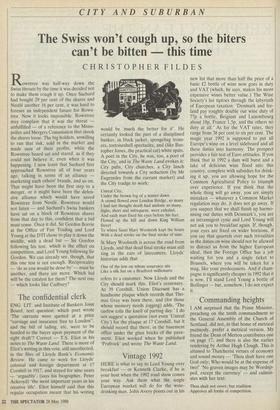The confidential clerk
ENG. LIT. and Institute of Bankers Joint Board, text question: which poet wrote 'The currants were quoted at a price "carriage and insurance free to London", and the bill of lading, etc, were to be handed to the buyer upon payment of the sight draft'? Correct — T.S. Eliot in his notes to The Waste Land. There is more of Eliot's writing in this vein, still uncollected, in the files of Lloyds Bank's Economic Review. He came to work for Lloyds' colonial and foreign department at 17 Cornhill in 1917, and stayed for nine years — 'arguably', (says his biographer, Peter Ackroyd) 'the most important years in his creative life'. Eliot himself said that this regular occupation meant that his writing would be 'much the better for it'. He certainly looked the part of a disciplined banker, in black jacket, spongebag trous- ers, tortoiseshell spectacles, and (like Bus- topher Jones, the practical cat) white spats. A poet in the City, he was, too, a poet of the City, and in The Waste Land evokes it: City pubs, City churches, a City lunch directed towards a City seduction (by Mr Eugenides from the currant market) and the City trudge to work:
Unreal City, Under the brown fog of a winter dawn A crowd flowed over London Bridge, so many I had not thought death had undone so many. Sighs, short and infrequent, were exhaled, And each man fixed his eyes before his feet. Rowed up the hill and down King William Street To where Saint Mary Woolnoth kept the hours With a dead stroke on the final stroke of nine.
St Mary Woolnoth is across the road from Lloyds, and that dead final stroke must still ring in the ears of latecomers. Lloyds' historian adds that
One of the low on whom assurance sits Like a silk hat on a Bradford millionaire refers to a customer. Now Lloyds and the City should mark this, Eliot's centenary. At 39 Cornhill, Union Discount has a handsome plaque which records that Tho- mas Gray was born there, and (for those whose memory needs jogging) adds, 'The curfew tolls the knell of parting day.' I do not suggest a quotation (not even 'Unreal City') for the plaque at 17 Cornhill, but it should record that there, in the basement office under the glass bricks of the pave- ment, Eliot worked when he published 'Prufrock' and wrote The Waste Land.


















































 Previous page
Previous page